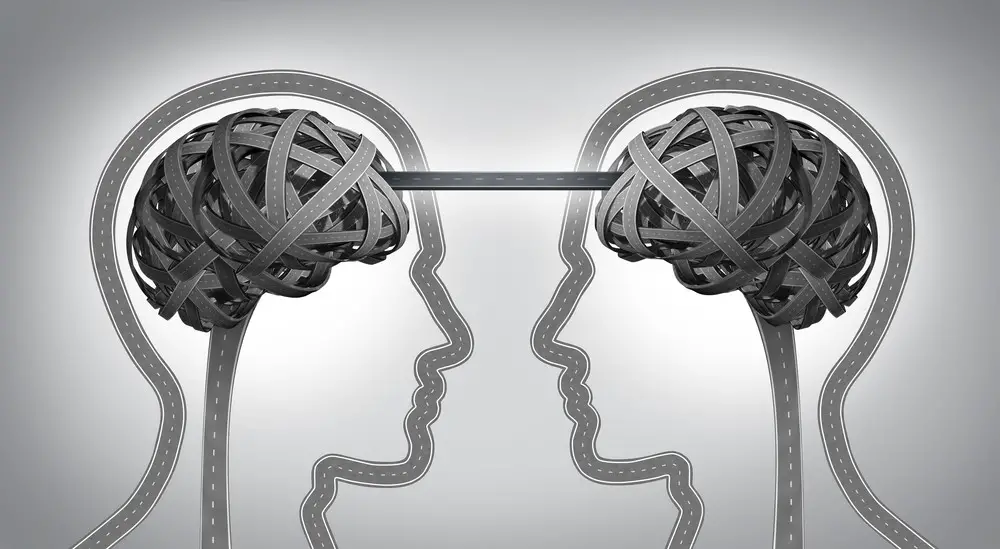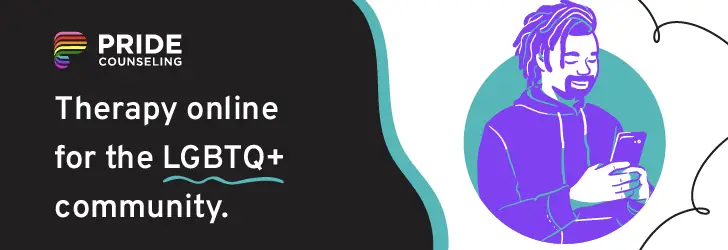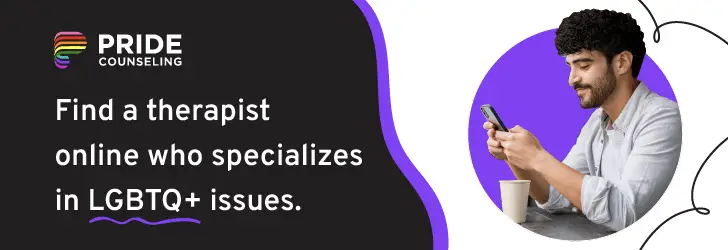As a BetterHelp affiliate, we receive compensation from BetterHelp if you purchase products or services through the links provided
Demisexuality, a sexual orientation on the asexuality spectrum, is often misunderstood. People who identify as demisexual only experience sexual attraction after developing a deep emotional connection with someone. It’s essential to understand how demisexuality differs from other orientations to navigate building intimacy and turning on a demisexual partner. Communication, patience, and emotional bonding are crucial to fostering a romantic relationship with someone who identifies as demisexual.
Understanding demisexuality will help you develop a strong personal connection, vital in igniting attraction and desire. Building a foundation of emotional intimacy comes before engaging in physical acts for a demisexual person, so taking the time to get to know them and showing genuine interest in their feelings, thoughts, and experiences will pave the way for sexual attraction to blossom. The key is approaching the relationship with an open mind, accepting and respecting your partner’s unique perspective on attraction and intimacy.
Key Takeaways
- Demisexuality is an orientation on the asexuality spectrum where sexual attraction occurs only after a deep emotional bond is formed.
- Building emotional intimacy and understanding your partner’s needs is critical for fostering a romantic connection with a demisexual person.
- Communication, patience, and respect are essential to develop and maintain a fulfilling relationship with someone who identifies as demisexual.

Understanding Demisexuality
Demisexuality is a complex and nuanced aspect of human sexuality. It means that a person requires a strong emotional bond with someone before they can feel sexual attraction. It’s important to know that demisexuality is distinct from other orientations, and every demisexual individual has unique experiences.
To better understand demisexuality, keep these points in mind:
- Individual experiences: Demisexuality varies greatly from person to person, so listening to your partner’s feelings and experiences is essential. Communicate with them openly and honestly about their needs and preferences.
- Emotional connection: Building a strong emotional bond is crucial for a demisexual person. This connection can be created by supporting, caring, and genuinely being there for your needy partner.
- Patience: It takes time for demisexual individuals to develop sexual attraction, so be patient and don’t rush the process. Respect their need for emotional connection and allow the relationship to develop organically.
- Boundaries: Establish and maintain healthy boundaries in the relationship. Ask your partner about their comfort levels, and always respect their wishes.
Maintaining a friendly, open attitude and paying attention to your partner’s desires and needs can create an inclusive, safe space for a demisexual individual to flourish. Remember, what works for one person might not work for another, so stay attentive and adjust your approach accordingly.
Demisexuality Vs. Other Orientations
Demisexuality is a unique sexual orientation within the diverse spectrum of human sexuality. While each orientation has nuances, it’s essential to understand how demisexuality compares and contrasts with other orientations.
Asexual Vs. Demisexual: Both asexual and demisexual individuals often experience limited sexual attraction. However, a key difference lies in this attraction. Asexual people don’t typically experience sexual attraction towards anyone, while demisexuals can develop a sexual attraction once they form a deep emotional bond with someone.
Heterosexual, Homosexual, Bisexual, Pansexual, and Queer: These orientations differ from demisexuality based on how sexual attraction is experienced. These individuals can experience sexual attraction based on gender or gender identity without necessarily needing an emotional connection first. On the other hand, demisexuality is rooted in emotional connection rather than gender.
Allosexual: This term refers to individuals who are not within the asexual spectrum, which includes demisexuals. They may feel sexually attracted to others regardless of emotional connection or lack thereof.
Sapiosexual: Sapiosexual individuals feel sexual attraction to those they perceive as intelligent. It can be experienced alongside other orientations but doesn’t require an emotional bond.
Polyamorous: Polyamory is a relationship style, not a sexual orientation. Nonetheless, it’s relevant because demisexual individuals could still engage in polyamorous relationships if they form multiple emotional connections.
Here are some key takeaways:
- Demisexuality is distinct from other sexual orientations, primarily involving sexual attraction based on emotional connection.
- Asexual individuals don’t typically experience sexual attraction, while demisexuals can develop attraction after forming deep emotional bonds.
- Each person’s experience of their orientation is unique, and understanding the nuances can help foster empathy and respect among individuals of different orientations.
 The Sexual Attraction Spectrum
The Sexual Attraction Spectrum
As a demisexual, it’s essential to understand the various types of attraction that may play a role in forming connections with others. The sexual attraction spectrum consists of several elements that shape an individual’s experience with attraction.
Attraction is a multifaceted concept that goes beyond just physical appeal. It encompasses many feelings and emotions that draw one person to another. In demisexuality, attraction may be influenced or even intensified by emotional connection.
Sexual attraction is the desire to engage in sexual activity with a specific individual. For demisexuals, this attraction tends to develop after an emotional bond has been established. This distinguishes it from primary sexual attraction based solely on physical appearance or chemistry.
Primary sexual attraction is the desire to engage in sexual activity with someone based on initial physical attraction or an instant “spark.” It is more common in people not in the asexual or demisexual spectrum. This type of attraction may not be significant for a demisexual person, as their sexual attraction typically arises from a deeper emotional connection.
Aesthetic attraction refers to appreciating someone’s physical appearance without necessarily wanting to engage in sexual or even romantic activity. It can be one aspect of the sexual attraction spectrum for demisexuals, especially when combined with other forms of attraction.
To better navigate the sexual attraction spectrum as a demisexual, consider the following tips:
- Take notice of the different forms of attraction you experience, acknowledging that they may change or develop over time.
- Openly communicate with your partner(s) about your sexual needs and boundaries, and find ways to show affection accordingly.
- Be patient in forming connections, understanding that building emotional bonds may take time and effort.
By exploring the sexual attraction spectrum and developing a more in-depth understanding of your attractions as a demisexual, you can foster deeper connections and establish truly fulfilling relationships.
 Emotional Connections and Demisexuality
Emotional Connections and Demisexuality
As a demisexual individual, forging an emotional connection is key to your experience of sexual attraction. Emotional connections play a significant role in establishing trust and intimacy between you and your partner.
- An emotional bond is essential to feel a strong attachment with your partner. This connection can be fostered by being open, honest, and vulnerable with one another, allowing you to trust each other.
- Building an emotional connection relies on mutual understanding and empathy. Active listening, genuine interest in your partner’s life, and engaging in meaningful conversations can strengthen this connection.
- To achieve emotional intimacy, it’s important to create a safe space where both of you feel comfortable expressing your thoughts and feelings without judgment. This can lead to deep conversations and shared experiences, enabling the emotional connection to grow.
- To strengthen emotional attachment, consistently nurture the relationship by being there for one another, supporting each other’s goals, and appreciating their qualities. This will manifest a close bond that is important for your demisexual nature.
- Trust is paramount in any relationship, but it carries additional weight for you as a demisexual. Communicating openly about your feelings, boundaries, and expectations is vital to creating a sense of security in your relationship.
- Forming a close bond with your partner through shared experiences, both positive and negative, can enhance the emotional connection. This bond can be built through various activities like traveling together, achieving mutual goals, or simply spending quality time with one another.
Remember, as a demisexual, the foundation of your sexual attraction lies in developing and nurturing a strong emotional connection with your partner. Prioritizing emotional intimacy, trust, and attachment will help create the right environment for you to explore your sexuality fully.
The Asexuality Spectrum
The asexuality spectrum is a continuum that encompasses a diverse range of sexual orientations and identities. Within this spectrum, you will find individuals who identify as demisexual. Understanding the nuances of this spectrum will help you appreciate the unique experiences that demisexual individuals navigate through and give you insights on how to connect with them on a deeper level.
Asexuality, at one end of the spectrum, is the lack of sexual attraction towards others. People who identify as asexual do not experience the same sexual desires commonly associated with other sexual orientations. It is essential to remember that asexuality is a sexual orientation and not a disorder or a choice:
- Asexual: No sexual attraction to others
- Gray-Asexual: Experience minimal sexual attraction or only under certain circumstances
- Demisexual: Sexual attraction develops after forming an emotional bond
Demisexuality is a unique orientation on the asexuality spectrum. Demisexuals experience sexual attraction only after forming a strong emotional bond with their potential partner. Their sexuality is deeply connected to their emotions and personal connections with others, making the process of turning them on less about physical desires and more about fostering an emotional attachment.
Some tips for connecting with a demisexual partner include:
- Be genuine and honest in your interactions
- Communicate openly about your feelings and emotions
- Invest time and energy in building a strong emotional bond before pursuing sexual activities
- Be patient and understanding, as it may take more time for a demisexual partner to feel comfortable with sexual experiences.
 Dating As a Demisexual
Dating As a Demisexual
When you’re demisexual, dating can sometimes feel overwhelming and confusing. But fear not; you can navigate the dating world more comfortably and build meaningful connections with the following tips and strategies.
Find like-minded people: While you can use popular dating apps like Tinder, consider exploring platforms like OKCupid or Match, where you can add more information about your demisexual identity. Additionally, niche dating apps and websites cater to demisexual individuals, making it easier to find a compatible match.
Communicate your needs: Be open and honest about your demisexual identity when dating or pursuing relationships. Discussing your preferences and unique qualities early on will help your potential partner understand your needs and expectations in a healthy relationship.
Take your time: Demisexuals often need to establish an emotional connection before experiencing attraction. Allow yourself the time and space to forge genuine connections without feeling pressure to leap straight into a romantic or sexual relationship. This slow approach can lead to a stronger and more fulfilling partnership.
Focus on shared interests: Engage in activities you and your potential partner enjoy to create a deep bond. This can be anything from hobbies, social clubs, or volunteering for a cause close to your heart.
Prioritize emotional intimacy: Build trust, show vulnerability, and support one another by discussing your thoughts, feelings, and experiences. Emotional intimacy is crucial for forming lasting connections with someone who understands and appreciates your demisexual identity.
Know your boundaries: Establish clear emotional and physical boundaries within the relationship. Communicate your comfort levels and respect your partner’s boundaries as well. Knowing your boundaries is crucial in maintaining a healthy relationship for both individuals.
And remember: dating as a demisexual doesn’t have to be challenging. By employing these tips and embracing your unique approach to relationships, you can increase your chances of finding meaningful connections and nurturing a satisfying partnership.
 Personal Identity and Labels
Personal Identity and Labels
Understanding one’s sexual identity can be a complex and deeply personal journey. For demisexual individuals, it’s essential to recognize that your identity is valid and unique to you. Everyone’s experience with demisexuality may vary, but here are some aspects to consider:
- Self-awareness: Exploring and understanding your feelings, desires, and attractions is crucial. By being honest with yourself about your demisexual identity, you allow yourself the freedom and authenticity to be who you truly are.
- Communication: Share your identity with those you trust and feel comfortable with. Open discussions about your sexuality can help foster understanding and support from loved ones and build a sense of community with other demisexual individuals.
When it comes to personal identity and labels, remember:
- Labels are tools to help you describe your sexual identity, but they don’t define you or limit your experience. Your identity is unique and evolving, and you can choose which labels feel most appropriate to describe this aspect of yourself.
- Avoid comparing yourself to others – every individual’s experience of their sexual identity is personal and distinct. Embrace your journey and allow yourself the space to grow and develop as you navigate your demisexual identity.
In embracing your demisexual identity, consider these key takeaways:
- Be gentle with yourself and remember that one’s sexual identity is unique and personal
- Foster self-awareness and open communication with loved ones
- Remember that labels help describe your identity but don’t define you or your experience.
Demisexual in the Community
As a demisexual, you may find connecting with others who share your experiences and perspectives helpful. One of the best ways to do this is by seeking out communities where you can discuss matters relevant to your identity and relationships.
Join the subreddit: Reddit is a popular platform for various communities, including the demisexual community. The subreddit r/demisexuality is an excellent place to start. Share your thoughts, ask questions, and learn from fellow demisexuals who understand what it’s like to be in your shoes.
Engage in conversation: Participate in online discussions, attend virtual meetups, and actively contribute to forums focused on demisexuality. These discussions will help you understand how others experience their demisexual identity, provide support, and speak openly about your experiences.
Contribute resources: As you explore the demisexual community, you might find helpful resources such as articles, videos, podcasts, or personal stories that resonate with you. Share these valuable insights within your community to help raise awareness and understanding of demisexuality, among others.
Take breaks when needed: While being part of an online community can be empowering, it’s essential not to let it consume your time and energy. Remember to balance your online and offline life, taking time for self-care and nurturing activities.
Here are some key takeaways for making the most of your engagement in the demisexual community:
- Join r/demisexuality on Reddit and engage in discussions
- Attend virtual meetups and contribute to online forums
- Share valuable resources to help others learn and grow
- Remember to take breaks and practice self-care
Physical Attraction and Appearance
When it comes to attracting a demisexual person, physical appearance plays a lesser role compared to emotional connections. However, maintaining a good appearance can still be beneficial. Here are some tips to keep in mind:
- Be genuine and authentic: Demisexual individuals are more likely to be attracted to those who display genuine and authentic behavior. Be yourself and embrace your natural look rather than changing your appearance to fit someone else’s idea of what is attractive.
- Stay well-groomed: While physical appearance may not be the main factor for attraction, taking care of yourself and your hygiene can help make you feel more comfortable and confident. This includes showering regularly, brushing your teeth, and wearing clean clothes that make you feel good about yourself.
- Dress comfortably: Choose clothing that fits your style and makes you feel good. Demisexual individuals are often more attracted to those they feel comfortable with, and wearing clothes you’re comfortable in can help create that sense of ease.
- Body language: Be conscious of your body language, including posture, eye contact, and facial expressions. These nonverbal cues can communicate your feelings and intentions to others, which might help you connect emotionally with a demisexual person.
Here are some key takeaways to remember:
- While physical attraction isn’t the primary factor for demisexual individuals, maintaining a good appearance can still have benefits.
- Be genuine, authentic, and comfortable in your skin.
- Take care of your personal hygiene and body language to establish a sense of comfort and confidence.
Following these tips can help create an environment where a demisexual person may feel more open to connecting emotionally, which is crucial for developing attraction in this relationship dynamic.
The Role of Intelligence in Attraction
As a demisexual, you may find that your attraction to someone isn’t immediately apparent. One key aspect that can truly ignite your interest is intelligence. Keep these points in mind when connecting with a potential partner:
- Intelligence can come in various forms: Keep an open mind to different types of intelligence – from emotional and social to logical and mathematical. You may find your attraction is drawn to different facets of their mind.
- Healthy conversations: Engaging in meaningful conversations can be a great way to explore someone’s intellect and mutual interests. You’re likely to fuel your desire for this person through deep and thoughtful discussions.
- Show your intelligence: Sharing your knowledge and insights on different topics can be very attractive to others. Displaying your intellectual side can open up more opportunities for connection.
- Seek wise individuals: Look for those who can make sound decisions. A wise person’s intelligence often stems from knowledge, experience, and good judgment.
- Understand their personality traits: Personality traits, such as curiosity, openness, and honesty, can be good indicators of a person’s intelligence. Be observant of these qualities as you get to know them.
As you consider these aspects of intelligence in attraction, remember to take your time building a strong emotional bond with the person. This foundation will ultimately enrich your connection and spark that special chemistry that you, as a demisexual, yearn for.
Understanding Primary and Secondary Attraction
When trying to understand demisexuality, it’s important to recognize the two types of attraction: primary and secondary.
Primary attraction refers to the initial, often physical attraction that people may feel when seeing someone. This type of attraction is usually what spurs interest in sexual activity. For many people, it’s the launching point for any romantic or sexual relationship.
On the other hand, secondary attraction is the attraction that develops over time as you get to know someone on a deeper emotional level. For demisexual individuals, secondary attraction is essential before they can develop an interest in sexual activity.
Here are some key features to keep in mind when navigating attraction with a demisexual partner:
- Focus on building emotional connections: Since demisexuals need secondary attraction, invest time and effort into getting to know your partner emotionally before exploring the possibility of sexual activity.
- Be patient and understanding: Respect their need for a deeper emotional connection and avoid pressuring them into sexual encounters.
- Communicate openly: Discuss your wants, needs, and boundaries with your partner to ensure a healthy relationship built on trust and understanding.
- Respect their identity: Demisexuality is a valid sexual orientation, and it’s important to be supportive and understand your partner’s experience.
Key Takeaway: Demisexual individuals primarily experience secondary attraction, so emotional intimacy is critical to their relationships. To turn on a demisexual, invest in building a strong emotional connection with your partner and maintain open communication and understanding.

Common Misconceptions About Demisexuality
Demisexuality is often misunderstood, leading to a range of misconceptions. By clarifying these common misunderstandings, we can better appreciate the unique experiences of demisexual individuals.
Demisexuality is not a choice: It’s vital to recognize that demisexuality is an innate sexual orientation, just like heterosexuality, homosexuality, or bisexuality. Demisexual individuals do not choose to be this way; it’s simply how they are wired.
Demisexuality is not celibacy or asexuality: While demisexual people experience sexual attraction only after forming a strong emotional bond, this doesn’t mean they are asexual or voluntarily abstaining from sex. Once that emotional connection has been established, they can experience sexual attraction like anyone else.
It’s not related to prudishness or shyness: A common misconception is that demisexual people are merely shy or prude regarding their sexuality. Sexual attraction for a demisexual individual is linked to their emotional connections and has nothing to do with being reserved.
Here are some further nuances to understand:
- Demisexuality spans a wide spectrum: Just like sexuality in general, demisexuality can exist on a spectrum. Some demisexual people might require a very deep emotional connection to feel sexual attraction, while others might form these connections more quickly.
- Demisexual people can experience romantic and physical attraction: It’s important to recognize that demisexual individuals can still experience romantic and physical attraction, even if they don’t feel a sexual attraction until later in the relationship.
Key takeaway: Demisexuality is a unique and valid sexual orientation often misunderstood. It is essential to recognize the distinct experiences of demisexual individuals and dispel any misconceptions. By doing so, we can foster inclusivity and understanding for everyone.
Resources for Understanding Demisexuality
Demisexuality can be complex and nuanced, so it’s important to have a solid understanding of it. Here are some helpful resources that can support you on your journey to better understand demisexuality:
- Cleveland Clinic: They offer a comprehensive library of articles about demisexuality and related topics. Explore their website to find healthcare professionals’ articles that can provide valuable insights and information. Visit their website here: Cleveland Clinic Health Library.
- Asexuality.org: The AVEN (Asexuality Visibility and Education Network) is a primary resource for learning about all things related to asexuality and demisexuality. This site offers a wealth of information, such as FAQs, personal stories, and forums to connect with others who identify as bisexual. Check out their resources at asexuality.org
- Books: A few books can help you explore demisexuality with the added depth and context that a book provides. Some titles to consider include:
- Demisexuality Resource Book by Arf Gray
- Asexuality: A Brief Introduction by Anthony F. Bogaert
- Online forums and communities: Engaging with others who identify as demisexual can help you better understand their experiences and perspectives. Joining online groups and communities, such as the AVEN forums or demisexuality subreddits, provides a space to ask questions and share experiences.
- Podcasts: Listening to others discuss demisexuality and related topics can broaden your understanding and provide different perspectives. Some podcasts that may be helpful are A OK and Asexualise.
Remember, when learning about demisexuality, it’s essential to approach the topic with empathy and an open mind. Listen to others’ experiences and be willing to educate yourself better to support yourself or the demisexual individuals.
 Navigating Demisexuality: When to Seek Therapy for Emotional Roadblocks
Navigating Demisexuality: When to Seek Therapy for Emotional Roadblocks
While demisexuality often adds a layer of complexity to relationships, it also emphasizes the importance of emotional connection and open communication. But what happens when those crucial relationship aspects become stumbling blocks instead of stepping stones? It might be time to consider therapy. Below are some signs to look out for:
Unresolved Emotional Baggage
If you or your partner are carrying emotional baggage that hinders the formation of a deep bond, a therapist can guide you through unpacking these issues. Old wounds and traumas may need more than just time to heal; therapy can provide the tools you need to move forward.
Strained Communication
Communication is key in any relationship, but it is highly important when you or your partner identifies as demisexual. If open and honest conversations become rare or overly charged, therapy can be a helpful conduit for meaningful dialogue.
Difficulties with Patience
Fostering an emotional connection with a demisexual partner often requires patience. If impatience creates friction or misunderstandings, therapy can help develop strategies to foster patience and emotional intelligence.
A Lack of Respect or Boundaries
Maintaining boundaries and mutual respect is vital in any relationship, especially when navigating the nuances of demisexuality. If either is compromised, professional guidance can be crucial to reestablishing these key aspects of a healthy relationship.
Emotional Detachment
Should you or your partner exhibit emotional detachment that becomes a barrier to forming the deep connections necessary for attraction and intimacy, therapy can offer techniques to cultivate emotional closeness.
The Challenge of Self-Acceptance
Demisexuality is a unique orientation that sometimes makes those who identify with it feel out of sync with societal norms. Therapy can offer the means to foster self-acceptance and personal growth.
Understanding demisexuality and fostering a successful relationship that celebrates it is an intricate process. Sometimes, professional help may be necessary to untangle emotional knots or provide a clearer landscape map. Therapy isn’t a sign of failure; it’s another tool in the toolkit of successful, emotionally intelligent relationships.
Get Expert Help for Your Unique Needs
Charting Progress and Aspirations: The Transformative Potential of Pride Counseling
Before we dive in, it’s important to note that I’m an affiliate of Pride Counseling. If you click on the banner ad for Pride Counseling and decide to sign up, I may receive a commission. It’s a way to support my work, allowing me to continue providing valuable insights like the ones below. Now, let’s get to the heart of the matter!
Navigating the waters of any relationship comes with its unique challenges, and when layers of identity, orientation, and emotional complexities are added, sometimes we need an expert to guide us. That’s where Pride Counseling comes in. Tailored for the LGBTQ+ community and its unique mental health needs, Pride Counseling offers a secure and stigma-free environment where you can work on your goals and track your progress.
Setting S.M.A.R.T Goals
The journey often starts with setting S.M.A.R.T (Specific, Measurable, Achievable, Relevant, Time-bound) goals. Whether fostering deeper emotional intimacy with your demisexual partner, working on communication skills, or focusing on self-care and mental well-being, establishing concrete objectives is the foundation for meaningful progress.
Pride Counseling: A Focused Approach
Pride Counseling stands out for its targeted approach to LGBTQ+ concerns, providing a unique space for discussions on identity, orientation, and any specific obstacles you might face in a relationship that wouldn’t be fully understood in a generalized counseling setting. With various professionals versed in the intricacies of LGBTQ+ mental health, you can confidently address the specific nuances of your experiences.
The Progress Journal
Maintaining a “Progress Journal” can be invaluable as you go through your counseling journey. Here, you can document breakthroughs, challenges, and evolving goals. It’s a concrete way of seeing how far you’ve come and where you’d like to go a roadmap.
Milestones and Revelations
Throughout your time with Pride Counseling, you’ll hit milestones—maybe it’s the first time you fully understood your partner’s demisexuality, or perhaps it’s when you recognize patterns in your behavior that you’d like to change. These moments of revelation serve as markers of progress, proving that the process leads to self-discovery and improvement.
Adapt and Re-evaluate
As you progress, your goals may change, and that’s okay. That’s expected! Use your progress to reassess your objectives. Maybe you’ve reached the emotional depth you were aiming for with your demisexual partner, and now you want to work on maintaining that connection long-term. Re-evaluation doesn’t signify backtracking; it’s a sign of evolution, of personal and relational growth.
Wrap Up
In a nutshell, Pride Counseling offers a specialized platform where you can set, meet, and reassess your relationship and mental health goals. The progress might not always be a straight line, but with the right tools and support, you can chart a course that leads to a more fulfilled and emotionally intelligent life.
Frequently Asked Questions
Do demisexuals experience sexual attraction?
Yes, demisexuals do experience sexual attraction, but it typically only occurs after forming a strong emotional connection with someone. This attraction might not happen with every close relationship but can emerge when a deep bond is present.
How can I support my demisexual partner?
- Be patient and understanding of their needs and feelings
- Communicate openly about your expectations
- Allow time for your relationship to grow before exploring sexual intimacy
- Respect their boundaries and provide a safe, comfortable space for them to express themselves
What are some dating tips for demisexuals?
- Choose activities that foster closeness, like sharing hobbies or interests
- Prioritize emotional intimacy by having deep conversations and exploring each other’s feelings
- Be honest about your demisexuality and communicate your needs to potential partners
- Give yourself time to develop connections; it’s okay to take things slow
How do demisexuals form deep connections?
- Engage in meaningful conversations that go beyond small talk
- Share personal experiences and listen to your partner’s stories
- Explore common interests and hobbies together
- Prioritize spending quality time with your partner to build trust and emotional intimacy
What are the challenges faced by demisexuals in relationships?
- Misunderstandings and misconceptions about demisexuality
- Feeling pressure to adhere to societal norms regarding dating and intimacy
- Difficulty navigating the balance between emotional and sexual connections
- Developing strong emotional attachments, resulting in a fear of rejection
How can one identify their demisexuality?
- Recognize patterns of only developing sexual attraction after forming strong emotional bonds
- Reflect on past relationships and attractions to understand your emotional and sexual needs
- Seek support and information from demisexual communities, online forums, or resources
- Consider speaking with a mental health professional or sexuality counselor for guidance and support
Jacob Maslow: Navigating the Nuances of Demisexuality and Life’s Legal Labyrinths
Hi there, I’m Jacob Maslow. I’ve got a couple of hats that I wear. One is an emotional compass, steering me through the complexities of identifying as demisexual. The other is a legal helmet, shielding me from the relentless hailstorm my narcissistic ex sends my way—courtroom dramas, custody battles, you name it.
Thanks to Lexapro and some therapeutic wisdom, I’ve kept a steady course through mental health challenges. But no pill can cure the impact of a toxic ex who flouts custody agreements and tries to alienate my kids. As she ages, her narcissism isn’t getting any finer, much like wine left uncorked for too long.
Do you know what helps me clear the cobwebs from my head? Long walks. Every single day. It’s my form of active meditation, my sanctuary from chaos.
I also write articles about mental health and narcissism. Why? Because if my rollercoaster of a life story can guide others through their ups and downs, then it’s worth telling. On top of that, I run a legal advice platform. Think of it as a lifeboat for those sinking in the quicksand of family court complexities.
Bottom line? We can all conquer our mental health challenges. I’m living proof. And while you’re conquering, make sure to understand and cherish the intricacies of who you are—whether that’s demisexual, straight, or anything in between.
- 3 Ways Wearing a Hat Can Help Lower Your Stress Levels - April 19, 2025
- Breaking the Silence: Why Men’s Mental Health Matters More Than Ever - April 15, 2025
- How to Transform a Home’s Patio Space into a Relaxing Space - March 23, 2025
This site contains affiliate links to products. We will receive a commission for purchases made through these links.


 The Sexual Attraction Spectrum
The Sexual Attraction Spectrum Emotional Connections and Demisexuality
Emotional Connections and Demisexuality Dating As a Demisexual
Dating As a Demisexual Personal Identity and Labels
Personal Identity and Labels

 Navigating Demisexuality: When to Seek Therapy for Emotional Roadblocks
Navigating Demisexuality: When to Seek Therapy for Emotional Roadblocks
